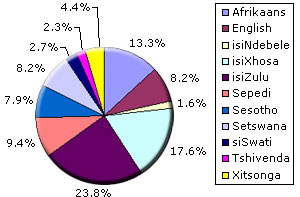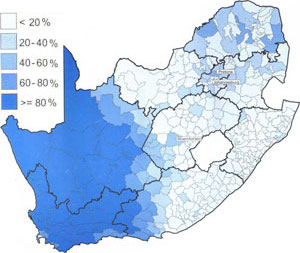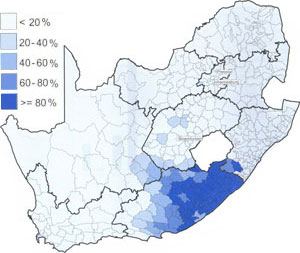3. READ THE TIMELINE CAREFULLY AND THEN ANSWER THE COMPREHENSION QUESTIONS.
4. LEARN SOME GEOGRAPHICAL FACTS ABOUT SOUTH AFRICA
Load this webpage http://en.wikipedia.org/wiki/Geography_of_South_Africa
or http://en.wikipedia.org/wiki/South_Africa
and fill in the FACT FILE
and fill in the MAP of South Africa
5. LANGUAGES
The Republic of South Africa (SAR), has 11 official languages. English is official and is the language of instruction and of the administration. Afrikaans is the language spoken mainly by the descendants of the Dutch colonizers, and it resembles Dutch. Then there are 9African languages: isisNdebele, isiXhosa, isiZulu, Sepedi, Sesotho, Setswana, siSwati, Tshienda and Xitsonga.
Language distribution
According to the 2001 census, isiZulu is the mother tongue of 23.8% of South Africa's population, followed by isiXhosa at 17.6%, Afrikaans at 13.3%, Sepedi at 9.4%, and English and Setswana each at 8.2%.
Language distribution

source: http://www.southafrica.info/ess_info/sa_glance/demographics/language
a) AFRIKAANS: Afrikaans has its roots in 17th century Dutch, with influences from English, Malay, German, Portuguese, French and some African languages.
Distribution of Afrikaans speakers  source:http://www.hsrc.ac.za/
source:http://www.hsrc.ac.za/
Initially known as Cape Dutch, Afrikaans was a spoken language for people living in the Cape, with proper Dutch the formal, written language.
Afrikaans came into its own with the growth of Afrikaner identity, and it was declared an official language - with English - of the Union of South Africa in 1925. The language was promoted alongside Afrikaner nationalism after 1948 and played an important role in minority white rule in apartheid South Africa. The 1976 schoolchildren's uprising was sparked by the proposed imposition of Afrikaans in township (black) schools.
Afrikaans is spoken mainly by white Afrikaners, coloured South Africans and sections of the black population. Although the language has European roots, today the majority of Afrikaans-speakers are not white.
- Home language to: 13.3% of the population
- Family: Indo-European
- Varieties: Eastern Cape Afrikaans (Oosgrensafrikaans, which became Standard Afrikaans), Cape Afrikaans (Kaapse Afrikaans) and Orange River Afrikaans (Oranjerivierafrikaans)
b) ENGLISH: English was declared the official language of the Cape Colony in 1822 (replacing Dutch), and the stated language policy of the government of the time was one of Anglicization. On the formation of the Union of South Africa in 1910, which united the former Boer republics of the Transvaal and Orange Free State with the Cape and Natal colonies, English was made the official language together with Dutch, which was replaced by Afrikaans in 1925.
Today English is the country's lingua franca, and the primary language of government, business, and commerce. It is a compulsory subject in all schools, and the medium of instruction in most schools and institutions.
As a home language, English is spoken by 10% of the population - one in three of which are not white. South Africa's Asian people, most of whom are Indian in origin, are largely English-speaking, although many also retain their languages of origin. There is also a significant group of Chinese South Africans, also largely English-speaking but who also retain their languages of origin as well.
South African English is an established and unique dialect, with strong influences from Afrikaans and the country's many African languages.
- Home language to: 8.2% of the population
- Family: Indo-European
- Varieties: Black South African English (BSAE), Indian English, Coloured English, Afrikaans English
c) XHOSA (ISIXHOSA)
South Africa's second-largest language, isiXhosa is also known as the Southern or Cape Nguni, and is closely related to isiZulu, the most common home language in the country. It is spoken mainly in the former Transkei, Ciskei and Eastern Cape regions.
Distribution of Xhosa speakers  source:http://www.hsrc.ac.za/
source:http://www.hsrc.ac.za/
IsiXhosa is one of the country's four Nguni languages. It is a tonal language, governed by the noun, which dominates the sentence.
Famous Xhosa South Africans include former President and Nobel Peace Prize Nelson Mandela, and current President Thabo Mbeki.
- Home language to: 17.6% of the population
- Family: Bantu Language Family
- Varieties: The most distinct variety is isiMpondo (isiNdrondroza). Other dialects include Thembu, Bomvana, Mpondimise, Rharhabe, Gcaleka, Xesibe, Bhaca, Cele, Hlubi, Ntlangwini, Ngqika, Mfengu
TAKE THIS LANGUAGES QUIZ and check what you learnt about the rich linguistic variety of South Africa.
6. SOWETO ACTIVITY and SOWETO PHOTO ALBUM. Soweto was a homeland, a town created for blacks. They couldn't leave it without a special pass.They couldn't own land, there was no electricity or running water or sewage. Many of the protests against the racist regime started here. You'll see the monument to Hector Peterson , a schoolboy who was killed by the police, and photos of some of the victims of Apartheid.
7. READING
South Africa has a rich tradition of tales about animals. Click here to read "When Elephant was King"(downloadable version) and then click here to do a funny activity.
8. WRITING
Imagine you are travelling in South Africa.Design a postcard with pictures that represent a feature of the country and write a friend describing what you are doing. Then send it to him/her.
After doing the activities, do this SELF-ASSESSMENT QUIZ to find out what you have leant